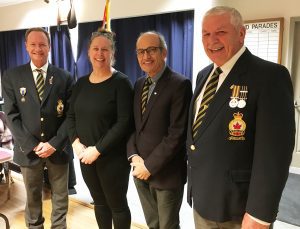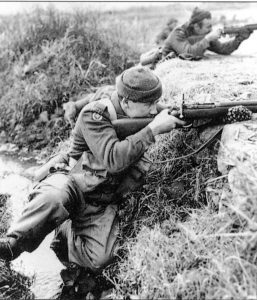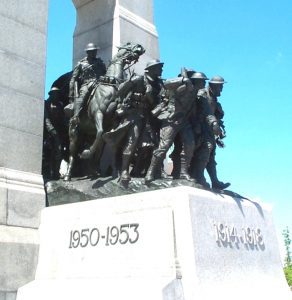
I accomplished something this week I’ve wanted to for probably 50 years. I recently received an email from Lew Gregor, friend and membership chair of the Royal Canadian Legion. He was inviting me to the Branch 170 general meeting Tuesday night.
“I want to welcome you,” his note said, “as a new member of the Legion.”
It may seem strange that a person who’s spent much of those 50 years interviewing veterans, researching Canadian military stories, writing books about wartime history and participating in Remembrance events across the country, would not already be a member of the Legion.
It’s not that such organizations as service clubs, community associations, boards, societies, or the Legion have never asked. Believe me. They all have. And I’ve always been grateful.
But – with the exception of some charities – I’ve always refused. Here’s why. As a rule, journalists and broadcasters are not joiners. Attempting to be fair – by not holding membership in such organizations – they observe, digest and report and let readers and audiences draw their own conclusions.
As an individual, I’ve always supported the work of Legion branches, contributing to the annual Poppy Fund, raising the profile of veterans’ rights, contributing to Legion youth-awareness programs, helping draw attention to PTSD issues, and supporting community events at the branch facility.
However, my military historical research has also shown me that the Legion’s relationship with veterans has not always been the best. Back in the 1950s, for example, Korean War vets faced huge challenges at the doorstep of the Royal Canadian Legion.

One case involved the homecoming of infantryman Bill Jackson to Brooks, Alta. By October 1952, he’d served a full year’s tour with Princess Patricia’s Canadian Light Infantry (PPCLI) and witnessed his share of warfare. On his first night in the hills opposite Chinese Communist forces, he had to bury dead soldiers before bedding down in his own slit trench.
During Operation Pepperpot, a U.N. offensive pushing north from the Imjin River, a Chinese mortar bomb explosion killed one of his friends right next to him. And many nights in his bunker he woke to see “the nose of a rat inches from my face.”
About a month after coming home, Jackson attended a Remembrance Day observance and then joined an evening smoker at the local Legion hall, just 40 or 50 vets sitting, drinking and telling war stories. At one point, a friend of the Jackson family rose to address the gathering. He and Jackson’s father had served together in the Great War.
“Hold it! Hold it!” the man called out. “We’ve got a guy just back from the trenches in Korea. And we’d like to welcome him.”
Jackson slowly got to his feet. But before he could utter a word, a voice boomed from the back of the hall, “Sit down, you a—–e. You were in Korea. So what?” The chauvinism of First and Second World War vets at the Legion prevailed and Jackson was never allowed to join.
On the flip side, bombardier Jim McKinny served with the Royal Canadian Horse Artillery in Korea. When his outfit returned to Winnipeg at the end of his tour, McKinny recalled marching downtown to the cenotaph marking only the fallen of two world wars. He felt a genuine excitement though knowing that his parents and girlfriend had come in from western Manitoba to welcome him home.
“But I couldn’t face my girlfriend,” he told me. “We only lived 23 miles apart. I had written to her every day I was away, but I just couldn’t put feelings into words. Korea made me a social misfit.” Eventually, his family and Lee, his girlfriend (later wife), helped McKinny through the post-traumatic stress disorder. More important, while living in Saskatoon, one day in the 1990s he stopped by the Legion to ask about tickets for a dance. They asked him to fill out a form, including his overseas service in 1952-53.

“Oh,” the Legion official said. “You’re a Korea veteran?”
“Can’t I join?” McKinny asked warily.
“Oh sure,” the man said. “I was just curious because your group meets here once a month. The Korea Veterans Association.”
When Jim McKinny joined Legion Branch 61 in Saskatoon, in 1991, he found a kindred spirit among fellow vets. And finally, thanks in large part to the Legion, he began to address his memories of service in Korea and even began campaigning with fellow KVA members to have local cenotaphs rededicated to include recognition of the Korean War and its veterans.
Through the memories of the women and men the Legion honours every day, I have come to understand with greater respect the importance of service, and have gladly joined its ranks to continue that work.
Welcome Ted!!!
We look forward to seeing you wherever possible.. the Legion is a friendly place and we love listening to you regale your stories!!
Hi Ted,
Thank you for joining the Legion and for honouring our Branch in Uxbridge. I was proud to welcome you as a fellow Comrade last Tuesday evening!
Yours in Comradeship,
Peter Viney
President,
Royal Canadian Legion,
Uxbridge Branch
P.S. Now you have my email address!